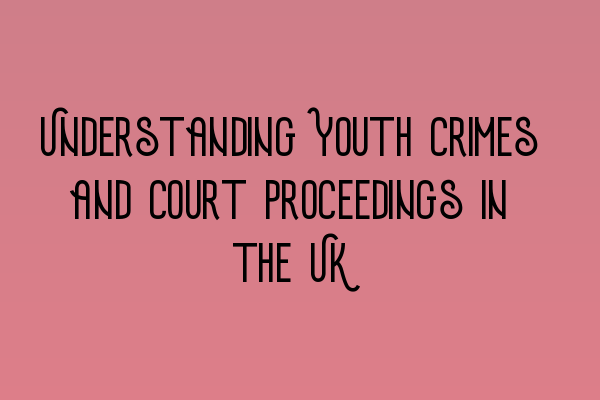Understanding Youth Crimes and Court Proceedings in the UK
Welcome to SQE Criminal Law & Practice Law UK, where we provide expert legal services and guidance. In this blog post, we will be discussing youth crimes and court proceedings in the UK. Understanding how the criminal justice system works for young offenders is crucial in promoting fairness and rehabilitation. Let’s dive into the details.
Youth Crimes: Definition and Categories
Youth crimes refer to offences committed by individuals who are under the age of 18. These crimes can range from theft, vandalism, assault, drug-related offenses, to more serious offences like robbery and even murder.
It is important to note that youth crimes can have different categories based on their severity. These categories include:
- Summary Offenses: These are minor offences that are typically dealt with in the youth court. Common examples include shoplifting and minor acts of vandalism.
- Indictable Offenses: These are more serious offences, such as robbery or murder, which are generally referred to the Crown Court for trial.
- Either Way Offenses: These offences can be dealt with either in the youth court or the Crown Court, depending on their complexity and severity.
Now that we have covered the categories of youth crimes, let’s take a closer look at the court proceedings for young offenders.
Court Proceedings for Youth Crimes
The court proceedings for youth crimes differ from those for adult offenders. The purpose is to focus on rehabilitation rather than punishment, taking into account the age and understanding of the young offender.
When a youth is charged with an offence, they will first appear in the youth court. The youth court is specifically designed to handle cases involving individuals under the age of 18, and there are different rules and procedures in place to ensure fairness and support.
In the youth court, the young offender will have the opportunity to enter a plea of guilty or not guilty. If they plead guilty, the case may proceed directly to sentencing, where the court will consider various factors, such as the seriousness of the offence, the youth’s criminal history, and any mitigating factors.
If the young offender pleads not guilty, the case will proceed to trial. The trial in the youth court is often less formal than in adult courts, and the court may use simpler language and explanations to ensure the young person understands the proceedings.
During the trial, the prosecution will present their case and call witnesses, while the defense will have the opportunity to challenge the evidence and present their own case. The young person will have the right to legal representation, and if found guilty, the court will determine an appropriate sentence.
Rehabilitation and Support
As mentioned earlier, the focus of court proceedings for youth crimes is on rehabilitation and support. The court has various options when it comes to sentencing young offenders, including:
- Referral Orders: This involves working closely with the youth offender, their parents, and other professionals to address underlying issues and prevent further offending.
- Custodial Sentences: In more serious cases, where a custodial sentence is deemed necessary, the court may order the young person to be detained in a youth offender institution or secure training center.
- Community-based Orders: These orders focus on addressing the young person’s needs while allowing them to remain in the community under certain conditions, such as attending programs, participating in community service, or receiving counseling.
It is important to note that the goal of these sentencing options is to promote rehabilitation, reduce reoffending, and support young offenders in making positive changes.
For more information on the SQE exams and legal preparation courses, you may refer to our related articles:
- SQE 1 Practice Exam Questions
- SQE 1 Practice Mocks FLK1 FLK2
- SQE 2 Preparation Courses
- SQE 1 Preparation Courses
- SRA SQE Exam Dates
Thank you for reading our blog post on understanding youth crimes and court proceedings in the UK. If you require legal advice or assistance, please feel free to contact SQE Criminal Law & Practice Law UK for expert guidance.
